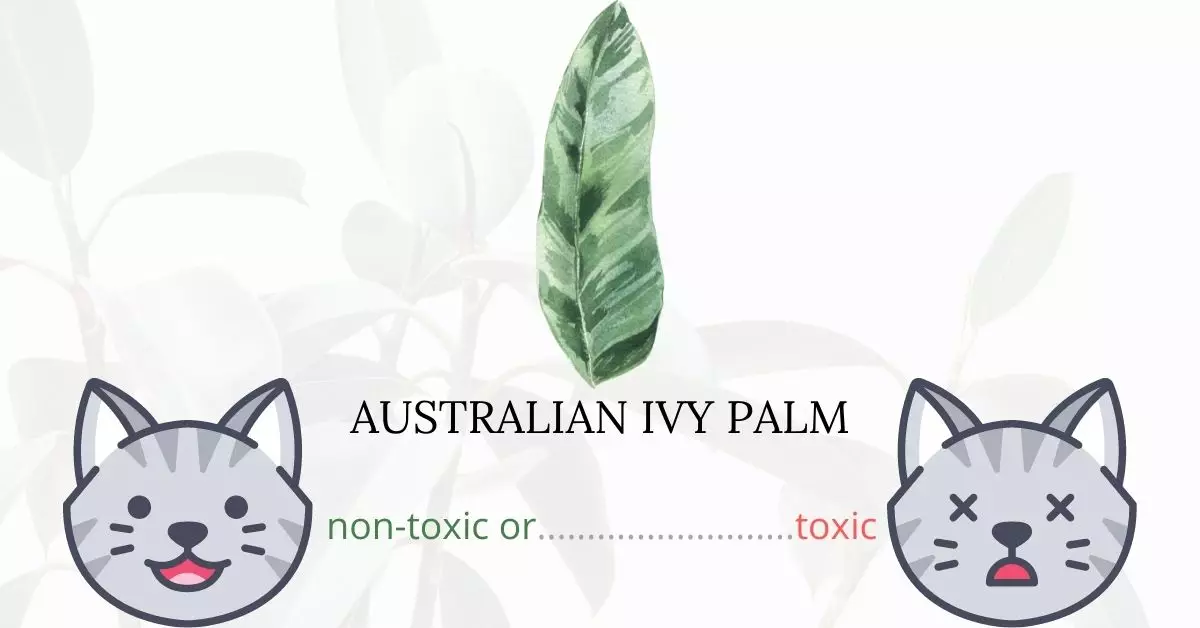The Australian Ivy Palm, scientifically known as Schefflera and recognized by various common names including Umbrella Tree, Octopus Tree, and Starleaf, is indeed toxic to cats. It contains harmful components such as terpenoids, saponins, and insoluble oxalates which pose significant risks to cats and other animals, leading to symptoms like loss of appetite, mild vomiting, and diarrhea. In rare instances, exposure to this plant can also cause ataxia and leucopenia.
This article is the product of collaborative efforts with a group of seasoned Doctors of Veterinary Medicine (DVMs). Their valuable insights and extensive experience allow us to deliver precise and current information about the potential dangers linked to different plants, focusing here on the Australian Ivy Palm, and their implications for cats. To reinforce the reliability of our information, we have also referred to high-authority websites such as ASPCA and PetMD to research every plant discussed, ensuring the accuracy and relevancy of the data presented to our readers.
Clinical Signs of Australian Ivy Poisoning in Cats
Clinical signs of poisoning by the Australian Ivy Palm in cats can vary in severity, but each symptom is a crucial indicator of potential harm, making immediate veterinary attention paramount. When a cat comes into contact, ingests, or even gets a whiff of the Australian Ivy Palm, the toxic components like terpenoids, saponins, and insoluble oxalates within the plant can cause detrimental effects.
- Loss of Appetite: This often occurs as the toxins in the plant interfere with the cat’s digestive system and overall well-being, making them feel unwell and reluctant to eat.
- Excessive Drooling: This may be due to irritation and burning sensations in the mouth and throat, signaling that the cat has chewed or ingested parts of the toxic plant.
- Burns to the Lips, Mouth, and Tongue: These are usually severe and are caused by the plant’s irritant compounds which react with the sensitive mucous membranes in the mouth.
- Swallowing Difficulties: The irritants found in the plant can lead to pain and swelling in the throat, causing discomfort and trouble while swallowing.
- Moderate Severity Diarrhea: The ingested toxins can disturb the gastrointestinal tract, leading to diarrhea. This can lead to dehydration if not promptly addressed.
- Vomiting: This is a common response when the body tries to expel the ingested toxic elements of the Australian Ivy Palm from the system.
Recognizing these clinical signs early and seeking immediate veterinary care can prevent further complications and ensure the well-being of your cat. Keep in mind that while most symptoms tend to be mild, they can escalate, and appropriate, timely medical intervention is critical.
First Aid and Treatment of Australian Ivy Poisoning in Cats
Replenishing your cat’s fluid is important particularly if your cat is experiencing severe diarrhea and vomiting. If your cat is at risk of swelling inside the mouth that may affect the airways, the veterinarian may give him or her diphenhydramine to reverse any swelling. Medication for stomach upset may be also given to your cat. In case of severe symptoms, the vet may require to retain your cat in his care for close monitoring.
Recovery from Australian Ivy Poisoning in Cats
Cats who ingested Australian ivy palm are more likely to get gastrointestinal upset. Some cats developed other symptoms in a few cases, but they were able to recover with swift and proper veterinary care.
Prevention of Australian Ivy Poisoning in Cats
If Australian Ivy plants grow in your yard, it is highly recommended to remove these to keep your cat safe and prevent reoccurrence of poisoning. Acquaint yourself with the local plants that grow in your area and check if there is a presence of Australian ivy. Make sure to keep your cats busy and mentally stimulated indoors. You may also consider using a modern play fence or cat house if you do not have one yet. You should also teach your cats to stay away from certain plants which are toxic for them.
If you love plants but have cats at home, check out these lists:





